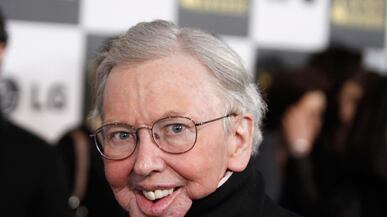On Friday night, Roger Ebert made a triumphal return to television, the first ever talk-show host without a voice of his own. After a 40-year career as a beloved print and TV movie reviewer, his face and voice were eclipsed by throat cancer. In 2008, it looked like he had reached the last exit. But Friday night on PBS, he was back for “a fourth act,” talking again about his passion, with a pleasantly familiar computer-generated voice, in a new show produced, financed, and wholly owned by his wife Chaz and himself: Ebert Presents At the Movies.

“I've been writing all my life,” he told me in an email interview. “To stop writing and stop speaking would be too much to bear.”
With a nicely shaded silicone prosthesis supplanting his neck and chin and creating a perpetual smile, the Pulitzer Prize-winning Chicago Sun-Times film critic looked not so very different at 68 than he did four years ago, when he was lost in a long dark tunnel of repeated surgeries, each one failing to rebuild his cancer-ravaged face.
ADVERTISEMENT
The problem stemmed from the original “cure”—the neutron beam radiation that had treated his earlier battle with thyroid cancer. “We moved to Seattle for a month and he had radiation every day,” says Chaz. ”It was difficult for Roger to eat. He’d come back from being zapped, nap, drink an Ensure through a straw, then we’d go out to a movie and he’d come back and write about it.”
The Eberts recalled that ordeal recently while they watched Michael Douglas, last fall, struggle through six hellish weeks of combined radiation and chemo to bombard his stage 4 throat cancer. Douglas never gave a thought to his mortality, according to his publicist and intermittent caregiver, Allan Burry. The macho actor announced from the start he would beat THE CANCER, and after “a wild six-month ride,” he put on his game face and told the world press on January 10th that he had indeed beaten it. Once he finished his “cancer tour” a week before the Golden Globe awards, he told Burry he didn’t want to dwell on it again; no more interviews.
Ebert told me he had confronted his mortality long before he got sick. “In college, I read this by Beckett: “They give birth astride of a grave, the light gleams an instant, then it’s night once more.” A stubborn optimist by nature, he thought he was out of the woods after that first successful battle with throat cancer.
In 2006, after a recurrence of cancer in his salivary glands, Ebert entered a Chicago hospital for surgery again, fully expecting to be out in two weeks and back on his TV show, At the Movies With Ebert and Roeper.
His wife was by his bedside every day, insisting they pray together, never mind that Ebert is an openly agnostic evolutionist. One day he asked her, “Can I borrow your faith?”
• Quizzing Roger Ebert’s New Co-Host “Roger was very upbeat,” Chaz recalls. “He followed his usual pre-surgery ritual.” On the ride to the OR, he handed his wedding band to Chaz and said, “I want to see you when I wake up the recovery room, and you’ll give me my ring back.” As the doors to the surgical suite swung closed, Chas dissolved in tears. She had dreamt that this time, things wouldn’t be easy. To her surprise, the surgery went well.
But afterward, Ebert’s chin and neck refused to heal. All the tissue around the irradiated area was falling apart, leaving the blood vessels below unsupported. But hospitals are paid only for the number of days designated by a code for the diagnosis on admission. And his cancer was gone.
Two weeks later, right on schedule, the doctors and nurses crowded into Ebert’s room to say goodbye. Chaz was getting a cup of coffee when she suddenly got the call: “Come up to the room—something’s gone wrong.” His carotid artery had ruptured.
Doctors couldn’t figure out how to stop bleeding. Over the next 18 months, Ebert circled in and out of operating rooms countless times. After each painful surgery, Chaz would hold up a mirror and her husband saw his face restored and felt hope. Within hours or days, when blood flow could not be sustained in the irradiated areas, his new neck and chin would collapse, again and again. He was “retired” from the Sun-Times.
How did he find the courage to go on?
Three things: His wife was by his bedside every day, insisting they pray together, never mind that Ebert is an openly agnostic evolutionist. One day he asked her, “Can I borrow your faith?”
Secondly, Ebert told me he sees being a film critic as his calling. And thirdly, Chaz Ebert endured the debilitating role as his constant caregiver because she listened to her doctor. “He told me that this was a marathon, not a sprint, and that I needed to take some time away to rest. So I arranged for my daughter and some friends to stay with Roger at the hospital while I took a weekend off at a spa and let others to take care of me, fix my food, plan my exercise.”
But the first time she went away, the seriousness of their situation hit her. She was so horrified, she stayed in her room, sobbing, had dinner delivered, took two bites, and slept like there was no tomorrow. “After two days, I had to get back to Roger. I was his advocate.” .
Chaz kept the Ebert company on life support, helping her husband compile his reviews into four books, plus one on cooking; and finding content to keep his website going. But lying inert in hospitals for a full year out of those 18 months, the otherwise indefatigable Ebert became so de-conditioned that he couldn’t walk. He had to go to the Rehabilitation Institute of Chicago four different times to relearn walking.
What did you do to convince Roger that life was worth living? I asked Chaz. “I told him that if he had the will to keep living, I would help him to find the way. That is the true sum of all of the prayers and meditations and visualizing walks with our grandchildren, the fact that my love would be there to shield him until he was able to fend for himself.”
Another reconstructive surgery was attempted at M.D. Anderson Cancer Center in Houston. When that, too, was a failure, the surgeon tried to persuade Ebert to try one more. Ebert typed out his answer on a laptop. “I’m done. I can still write, be with my family, travel, I never want to come back to a hospital again.”
That was his exit strategy. He had found blogging and that was his Godsend, he told me. The prolific critic has built a social network of over a million. There was no one moment when he was told he would never speak again. “If I’d known,” he cracked, “I would have said something memorable.”
The secret of his resurgence is summed up in one word: acceptance. With acute peripheral vision, he is able to say that few people look at his face in alarm. And after appearing again on TV, everyone now knows what he looks like. Roger Ebert gives new meaning to the old encomium: He is comfortable in his own skin.
Gail Sheehy is the author of 15 bestselling books, including the revolutionary Passages . Her most recent book is Passages in Caregiving: Turning Chaos Into Confidence.




